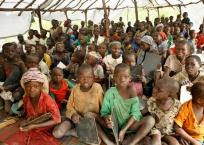Tear gas and other riot control agents were widely used by security forces against protesters
Tear gas and other riot control agents were widely used by security forces against protesters
© Amnesty International
Spanish-manufactured cluster munitions were found in Libya
Spanish-manufactured cluster munitions were found in Libya
© Amnesty International
Security forces in Egypt and elsewhere used shotguns against protesters
Security forces in Egypt and elsewhere used shotguns against protesters
© Omnia E. Al Desoukie
19 October 2011
The USA, Russia and European countries supplied large quantities of weapons to repressive governments in the Middle East and North Africa before this year’s uprisings despite having evidence of a substantial risk that they could be used to commit serious human rights violations, Amnesty International said today in a new report.
Arms Transfers To The Middle East And North Africa: Lessons For An Effective Arms Trade Treaty examines arms transfers to Bahrain, Egypt, Libya, Syria and Yemen since 2005.
"These findings highlight the stark failure of existing arms export controls, with all their loopholes, and underline the need for an effective global Arms Trade Treaty that takes full account of the need to uphold human rights," said Helen Hughes, Amnesty International’s principal arms trade researcher on the report.
"Governments that now say they stand in solidarity with people across the Middle East and North Africa are the very same as those who until recently supplied the weapons, bullets and military and police equipment that were used to kill, injure and arbitrarily detain thousands of peaceful protesters in states such as Tunisia and Egypt and are even now being deployed by security forces in Syria and Yemen."
The main arms suppliers to the five countries included in the report were Austria, Belgium, Bulgaria, Czech Republic, France, Germany, Italy, Russia, the UK and the USA.
At least 11 states have provided military assistance or allowed exports of weaponry, munitions and related equipment to Yemen, where some 200 protesters have lost their lives in 2011. These include Bulgaria, the Czech Republic, Germany, Italy, the Russian Federation, Turkey, Ukraine, the UK and the USA.
Despite the continued brutal crackdown against protesters, the international community has failed to take strong action to stem arms transfers to Yemen.
Obtaining arms data for Syria is difficult as few governments officially report on their arms trade with the Syrian government. But it is known that the biggest arms supplier to Syria is the Russian Federation with reportedly about 10 per cent of all Russian arms exports going there.
Russia does not publish an annual report on its arms exports meaning that its arms transfers to the region cannot be quantified.
India authorized the supply of armoured vehicles to Syria whilst France sold munitions between 2005 and 2009.
Amnesty International has identified 10 states whose governments licensed the supply of weaponry, munitions and related equipment to Colonel Mu’ammar al-Gaddafi’s Libyan regime since 2005, including Belgium, France, Germany, Italy, Russia, Spain and the UK.
During the conflict, al-Gaddafi forces have committed war crimes and abuses which may amount to crimes against humanity.
Spanish cluster submunitions and MAT-120 cargo mortar projectiles, licensed for sale in 2007, were found in Misratah by Amnesty International, when it was being shelled by al-Gaddafi forces earlier this year. This equipment is now prohibited by the Convention on Cluster Munitions which Spain signed less than a year after supplying the submunitions to Libya.
Much of the heavy weaponry found in Libya by Amnesty International researchers looks to have been manufactured during the Soviet-era – Russian or Soviet-made, especially the Grad rockets which are inherently indiscriminate and have been widely used by both sides during the conflict. Some of the munitions found were also Chinese, Bulgarian and Italian such as the Type 72 anti-tank mines, rocket fuses and 155mm artillery rounds, respectively.
At least 20 states have sold and supplied small arms, ammunition, tear gas and riot control agents, and other equipment to Egypt. The USA has been the biggest - annually providing $1.3 billion. Others include Austria, Belgium, Bulgaria, Italy, and Switzerland.
Shotguns were widely used in both Egypt and Bahrain by the security forces with devastating lethal effect.
Amnesty International recognized that the international community has taken some steps this year to restrict international arms transfers to Bahrain, Egypt, Libya, Syria and Yemen. But the organization said that existing arms export controls had failed to prevent the transfer of arms in the preceding years.
“Arms embargos are usually a case of ‘too little too late’ when faced with human rights crises,” said Helen Hughes.
“What the world needs is rigorous case by case evaluation of each proposed arms transfer so that if there is a substantial risk that the arms are likely to be used to commit or facilitate serious human rights violations, then the government must show the red stop light.”
“This proactive ‘Golden Rule’ is already in the UN draft paper for the Arms Trade Treaty talks which resume at the United Nations in February. If the major arms exporters fail to adopt the Golden Rule, and recklessly continue a ‘business as usual’ approach, fuelling human rights crises as we have witnessed across the Middle East and North African region this year, it will needlessly shatter lives and undermine global security."
href="https://blogger.googleusercontent.com/img/b/R29vZ2xl/AVvXsEjixODdMBXLTcyYcImmg4VCjq_b2odq3WIQMI9phJKwRO9ntAXOuanCeNHnguXWhhYN-o-ozLL07ddRL-mcDdlkfgTUobRO0swF2wuYuoI2BLqSeJu4GzVPVpQArnB7ZoTqzP0sRsu6pHa4/s1600/libya-gaddafi+20.10.11.JPG">

Libyans must see justice after death of Colonel al-Gaddafi
Colonel al-Gaddafi ruled with an iron fist for 42 years
Colonel al-Gaddafi ruled with an iron fist for 42 years
© www.kremlin.ru
20 October 2011
The death of Colonel Mu'ammar al-Gaddafi brings to a close a chapter of Libya's history marked by repression and abuse, but does not end the story, Amnesty International said today.
“The legacy of repression and abuse from Colonel Mu'ammar al-Gaddafi's rule will not end until there is a full accounting for the past and human rights are embedded in Libya's new institutions,” said Claudio Cordone, Senior Director at Amnesty International.
Legacy of repression
During his 42 years in power, al-Gaddafi ruled with an iron fist, stifling individual freedoms and any form of political dissent.
Thanks to al-Gaddafi, Libya’s public institutions were rendered largely inefficient or, like the criminal justice system, used as tools of repression. The country lacked an independent civil society, a free press or political parties.
"Colonel al-Gaddafi’s death must not stop his victims in Libya from seeing justice being done. The many Libyan officials suspected of serious human rights violations committed during and before this year's uprising, including the infamous Abu Salim prison massacre in 1996, must answer for their crimes,” said Claudio Cordone.
"The new authorities must make a complete break from the culture of abuse that Colonel al-Gaddafi’s regime perpetuated and initiate the human rights reforms that are urgently needed in the country."
This should include overhauling the criminal justice system to bring it in line with international standards, including by properly defining crimes like torture and extrajudicial executions.
Inquiry into death
Amnesty International called on Libya’s National Transitional Council (NTC) to make public information about how Colonel al-Gaddafi died, making the full facts available to the Libyan people.
It is essential to conduct a full, independent and impartial inquiry to establish whether Colonel al-Gaddafi was killed during combat or after he was captured, the organization said.
Amnesty International called on the NTC to ensure that all those suspected of human rights abuses and war crimes, including Colonel al-Gaddafi's inner circle and family members, are treated humanely and, if captured, given fair trials.








